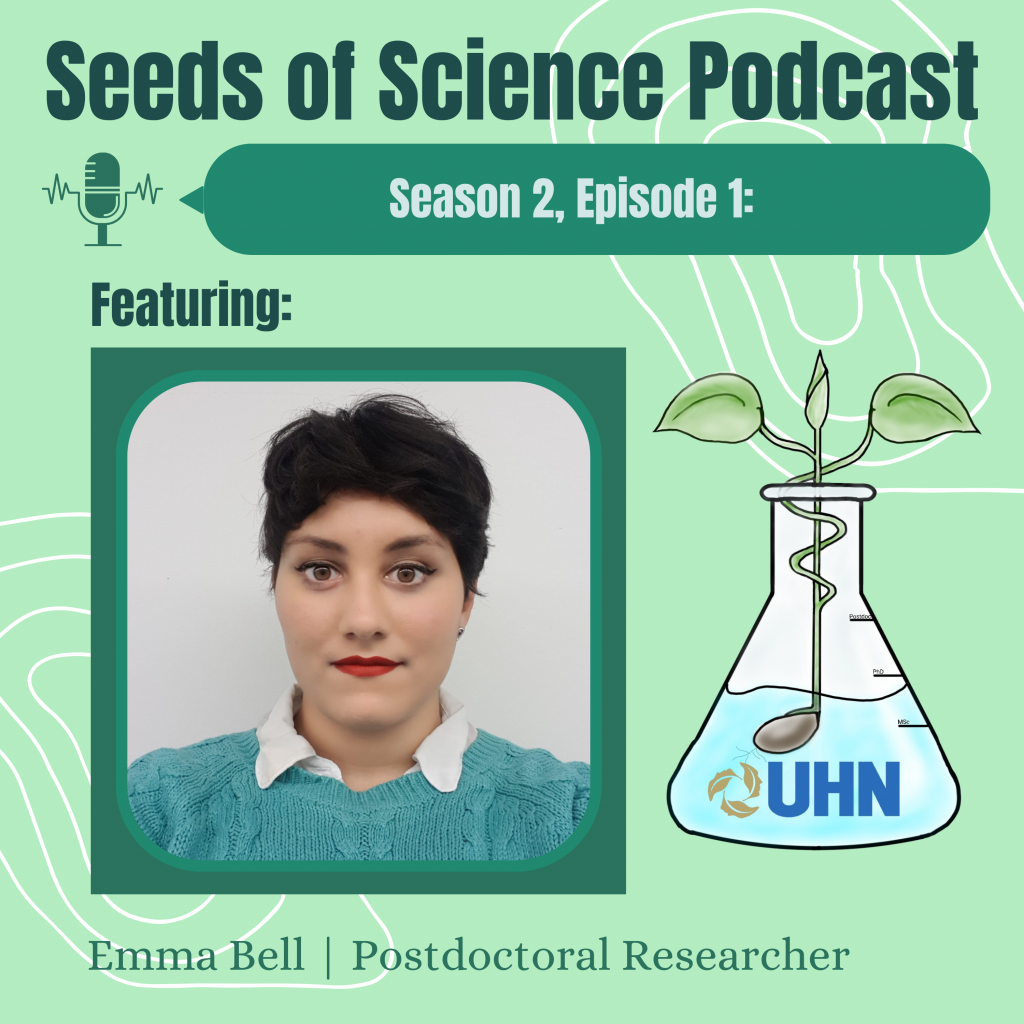Seeds of Science: Season 2, Episode 1
Bioinformatics to improve female health care - A chat with Dr. Emma Bell

Emma Bell falls in and out of love with academia on a daily basis. Their long-term career goal is to help become more compassionate and just through sex/gender health equity. Right now, they’re doing that by advocating for a more sustainable model of biomedical and healthcare research. But the stuff UHN pays them for is methods development of cell-free Methylated DNA Immunoprecipitation Sequencing, AKA cfMeDIP-seq, as an academic biomedical research tool. At present, Sophie the Corgi permits Dr Bell to live with her. We’ll see how that goes.
Position: Postdoctoral Researcher, Dr. Daniel De Carvalho’s lab
Pronouns: they/them
Listen to the episode on:
Meet Sophie the Corgi:

Connect with Emma:
Email: emma.bell@uhn.ca
Website: emmabell42
More information:
Ontario Rising Stars in Cancer Research Network
UHN 2SLGBTQIA+ Resources and Learning and Resource Centre (link requires UHN credentials). Sign up for the Committee’s mailing list here.
Princess Margaret Cancer Centre Research
Relevant publication: Preparation of cfMeDIP-seq libraries for methylome profiling of plasma cell-free DNA
Terms and acronyms used:
Epigenetics – chemical modifications of our DNA that changes how our genes are expressed. Some epigenetic changes occur by chance, whereas others result from biological and environmental factors.
Gynaecologic cancers – cancers that start in the female reproductive system. The five main types of gynecologic cancer are: cervical, ovarian, uterine, vaginal, and vulvar.
Tissue biopsy – a procedure to remove a piece of tissue or a sample of cells from your body so that it can be tested in a laboratory.
Liquid biopsy – a test of bodily fluid that detects cancer cells or DNA that are circulating in the blood, called “circulating tumor DNA” or “ctDNA.”
Bioinformatics – an interdisciplinary field of science that develops methods and software tools for understanding biological data, especially when the data sets are large and complex.
Information engineering – an engineering discipline that deals with the generation, distribution, analysis, and use of information, data, and knowledge in systems.
Machine learning – a branch of artificial intelligence (AI) and computer science which focuses on the use of data and algorithms to imitate the way that humans learn, gradually improving its accuracy.
DNA sequencing – a general laboratory technique for determining the exact sequence of nucleotides, or bases, in a DNA molecule.
RNA sequencing – lets us discover more about which genes are expressed (turned on) or suppressed (switched off) at different times in different types of cells.
Wet lab – Wet labs are for manipulating liquids, biological matter, and chemicals. Dry labs are focused on computation, physics, and engineering.
ADHD – Attention-deficit/hyperactivity disorder
R (statistical package) – R is one of the most comprehensive statistical programming languages available, capable of handling everything from data manipulation and visualization to statistical analysis.
Cell-free DNA – short fragments of DNA released into the bloodstream through a natural process of cell death.
DNA methylation – Methylation is a chemical modification of DNA and other molecules that may be retained as cells divide to make more cells. When found in DNA, methylation can alter gene expression
Endometriosis – a disease in which tissue similar to the lining of the uterus grows outside the uterus. Symptoms of endometriosis may include: excessive menstrual cramps, abnormal or heavy menstrual flow and pain during intercourse.
Intersex people – a blanket term describing people whose bodies do not fit typical binary notions of male or female. Intersex people may vary in the appearance and/or function of their sexual anatomy and/or reproductive organs, their sex chromosome, and other physiology related to human sex differences.
Disclaimer: The Seeds of Science podcast is supported by UHN’s Office of Research Trainees (ORT). The views expressed in the podcast episodes are not necessarily those of UHN or ORT.




